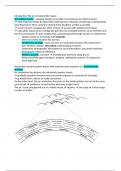Introduction: The arc of naturalistic inquiry
Naturalistic inquiry = studying people in everyday circumstances by ordinary means
observing how people go about their daily business, listening, considering, understanding,
reporting back to them, aiming to disturb these situations as little as possible
social research nowadays too often consists of surveys with statistical techniques
naturalistic inquiry aims to bridge the gulf than has emerged between social scientists and
the rest of humanity other insights that cannot be gained through surveys or experiments
- Studies society as it presents itself naturally
- Does not control situation like surveys
- Unobtrusive strategy = does not want to manipulate situations like experiments
- Aim: develop a deeper, theoretical understanding of society
- Statements, ethnographic descriptions of social interactions, document selections,
photographs, historical reflections
- Iterative process: not linear shuttling back and forth along the arc
doing something again and again, adapting, refining the research opposed to
linear approach
Naturalistic research project begins with relatively open questions on ‘foreshadowed
problem’
Arc symbolizes the distance the naturalistic inquirer travels
gradually questions become more focused by exposure to everyday life of people
gradually from a theory to make conclusions
On the other hand, the arc symbolizes the return to the initial problem, but not at the same
spot started problem is carried further and more insight into it
The arc is one enlargement out of a whole mosaic of inquiries one study of a much larger
number of studies
, Difference between participating in society naturally and researching society naturalistically
- With participating: effort to reflexively understand (= capacity to think about own
thinking) both society and own participation in it aware of own interpretations,
own thinking can interfere with participants, stay away from personal way of
describing, strict in way of explaining
arc presents road towards this reflexive understanding and competences required
at each stage
Qualitative research = generic approach in social research covering ethnography,
anthropological fieldwork, qualitative sociology, organizational fieldwork, interpretive
research, oral history, narrative research etc.
Naturalistic inquiry: art, craft, or recipe? Understand music learn notes, recipe, original
practices
- Art: as a result of extensive practice and exercise of learning, practicing etc. a craft
can engage in what we call art
- It is not solely a matter of technique; there may be better observers
having conversations, being alert, make sense out of sum total
yet to mobilize them in combination at the appropriate time, craft is needed
- Cooking: recipes are necessary: techniques and arts are necessary, but it ultimately
depends on craftsmanship
The empirical cycle = the arc symbolizes return to initial problem
observation induction deduction testing evaluation back to observation
Difference between empirical cycle and naturalistic inquiry: process with naturalistic inquiry
is not linear, empirical cycle implies that researcher always comes back to same spot






